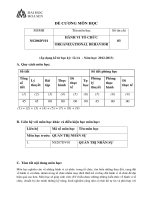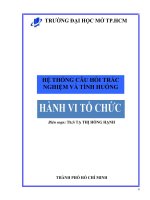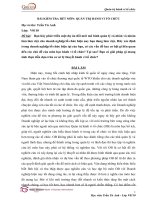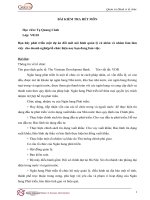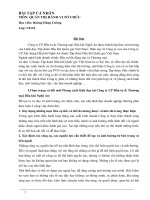Đề cương trắc nghiệm Hành Vi Tổ Chức (Organizational Behavior) CHƯƠNG 12
Bạn đang xem bản rút gọn của tài liệu. Xem và tải ngay bản đầy đủ của tài liệu tại đây (48.06 KB, 15 trang )
Chapter 12: Organizational Power and
Politics
12-1. Power in organizational settings is defined as:
a. Using formal authority on others to achieve organizational goals.
b. Any attempt to influence others using one's wit and knowledge.
c. The application of rewards and sanctions in ways that reinforces
desired behaviour.
d. The capacity of an individual, team, or organization to influence
others.
e. Cultivating social relationships with others for the purpose of
accomplishing one's goals.
The question was not answered. The correct answer
is "d". (Coaching responses are only available for answered questions)
12-2. Lee, a loans officer at Canbank Corp., often arrives late for work.
His manager would normally dismiss someone in this situation.
However, the manager tolerates Lee's behaviour (with the occasional
reminder and warning) because Lee is one of the best people in the bank
to secure new loans. In this situation, Lee has:
a. referent power
b. counterpower
c. legitimate power
d. delinquent power
e. no power over the manager
The question was not answered. The correct answer
is "b". (Coaching responses are only available for answered questions)
12-3. Jack is an employee at ABC Corp. Susan is Jack's immediate
supervisor. The contemporary literature on organizational power would
say that:
a. Jack is dependent on Susan, whereas Susan is independent of Jack.
b. Jack and Susan are independent of each other.
c. Jack and Susan are interdependent on each other.
d. Susan is dependent on Jack, whereas Jack is independent of Susan.
e. Susan and Jack are independent of each other.
The question was not answered. The correct answer
is "c". (Coaching responses are only available for answered questions)
12-4. The capacity of a person, team, or organization to keep a more
powerful person or group in the exchange relationship is called
a. discretion power.
b. coercive power.
c. counterpower.
d. visible power.
e. centrality power.
The question was not answered. The correct answer
is "c". (Coaching responses are only available for answered questions)
12-5. Which of these sources of power originates from the power
holder's own characteristics?
a. Reward
b. Expert
c. Coercive
d. Legitimate
e. All of these.
The question was not answered. The correct answer
is "b". (Coaching responses are only available for answered questions)
12-6. Which of these powers is the capacity to influence others through
formal authority?
a. Reward
b. Referent
c. Expert
d. Legitimate
e. Coercive
The question was not answered. The correct answer
is "d". (Coaching responses are only available for answered questions)
12-7. If a manager controls the allocation of pay, promotion, and work
assignments, and then uses them to achieve compliance from employees,
s/he is said to be using which power?
a. Referent
b. Reward
c. Expert
d. Counterpower
e. None of these
The question was not answered. The correct answer
is "b". (Coaching responses are only available for answered questions)
12-8. The capacity to influence others through the ability to apply
punishment refers to __________ power.
a. referent
b. coercive
c. expert
d. legitimate
e. reward
The question was not answered. The correct answer
is "b". (Coaching responses are only available for answered questions)
12-9. Which source of power are employees gaining as society moves
from an industrial to a knowledge-based economy.
a. Expert
b. Coercive
c. Referent
d. Legitimate
e. Reward
The question was not answered. The correct answer
is "a". (Coaching responses are only available for answered questions)
12-10. Employees who are able to cope with organizational uncertainty:
a. are mainly using their expert power.
b. tend to lack power in organizations.
c. have high levels of rewards and referent power.
d. have low centrality and high substitutability.
e. have all of the above.
The question was not answered. The correct answer
is "a". (Coaching responses are only available for answered questions)
12-11. Which of these is a contingency of power in organizations?
a. Expertise
b. Coercion
c. Rewards
d. All of the above
e. None of the above
The question was not answered. The correct answer
is "e". (Coaching responses are only available for answered questions)
12-12. A maintenance group destroys the manuals for repairing a special
piece of equipment, which has been altered from the original model.
This action will likely increase power among maintenance employees
by:
a. Increasing centrality.
b. Increasing substitutability.
c. Decreasing centrality.
d. Decreasing substitutability.
e. Decreasing their expertise.
The question was not answered. The correct answer
is "d". (Coaching responses are only available for answered questions)
12-13. People and work units can increase their power through
nonsubstitutability using all of these ways EXCEPT:
a. controlling knowledge
b. differentiation.
c. absorption.
d. controlling labour.
e. controlling tasks.
The question was not answered. The correct answer
is "c". (Coaching responses are only available for answered questions)
12-14. Which source of power usually generates resistance by the person
or department being influenced?
a. Reward
b. Expert
c. Legitimate
d. Referent
e. Coercive
The question was not answered. The correct answer
is "e". (Coaching responses are only available for answered questions)
12-15. Forming coalitions and cultivating networks are best described as
forms of:
a. Groupthink
b. Organizational politics.
c. Counterpower.
d. Substitutability.
e. Legitimate power.
The question was not answered. The correct answer
is "b". (Coaching responses are only available for answered questions)
12-16. According to the textbook, power and politics problems in office
romances should be minimized by:
a. removing employees from positions of organizational power over
their partner in the relationship.
b. prohibiting employees from have intimate relationships with coworkers.
c. ensuring that employees keep their intimate relationships with coworkers quiet so that other employees and corporate leaders do not know
about this.
d. dismissing the junior employee in the relationship so the more senior
person does not abuse his/her position of power.
e. Requiring employees to sign a "love form" whenever they have an
intimate relationship or would like to form such a relationship with
another employee.
The question was not answered. The correct answer
is "a". (Coaching responses are only available for answered questions)
12-17. Cultivating social relationships with others to accomplish one's
goals is known as
a. managing impressions.
b. mentoring.
c. networking.
d. creating obligations.
e. coalition building.
The question was not answered. The correct answer
is "c". (Coaching responses are only available for answered questions)
12-18. People who frequently use power to manipulate others toward
their own personal goals probably have:
a. a strong need for socialized power.
b. high Machiavellian values.
c. expert power.
d. an external locus of control.
e. a high power distance.
The question was not answered. The correct answer
is "b". (Coaching responses are only available for answered questions)
12-19. The textbook explains that sexual harassment is typically caused
by which two factors?
a. Networking and expert power.
b. Ambiguous work rules and too many resources.
c. Mentoring and nonsubstitutability.
d. Referent power and "love forms".
e. An abuse of power and stereotyping the victim as subservient.
The question was not answered. The correct answer
is "e". (Coaching responses are only available for answered questions)
TRUE or FALSE
12-1. Power does not exist until the power holder actually possesses
something that another person values.
True / False
The question was not answered. The correct answer
is "False". (Coaching responses are only available for answered
questions)
12-2. The most basic prerequisite of power is that one party believes he
or she is dependent on the other for something of value.
True / False
The question was not answered. The correct answer
is "True". (Coaching responses are only available for answered
questions)
12-3. Counterpower usually results in executives abusing their power for
personal gain.
True / False
The question was not answered. The correct answer
is "False". (Coaching responses are only available for answered
questions)
12-4. According to French and Raven, legitimate, expert and referent
power sources are derived from the power holder's position.
True / False
The question was not answered. The correct answer
is "False". (Coaching responses are only available for answered
questions)
12-5. People in high power distance cultures are more likely to comply
with legitimate power than people in low power distance cultures.
True / False
The question was not answered. The correct answer
is "True". (Coaching responses are only available for answered
questions)
12-6. The wheel formation information flow structure allows some
employees to gain power through information control.
True / False
The question was not answered. The correct answer
is "True". (Coaching responses are only available for answered
questions)
12-7. The centralized information control structure is most compatible
with knowledge management and team-based organization concepts.
True / False
The question was not answered. The correct answer
is "False". (Coaching responses are only available for answered
questions)
12-8. Technology is a substitute for employees and, consecutively,
reduces union power.
True / False
The question was not answered. The correct answer
is "True". (Coaching responses are only available for answered
questions)
12-9. An employee's ability to influence others increases as the source of
his or her power becomes more nonsubstitutable.
True / False
The question was not answered. The correct answer
is "True". (Coaching responses are only available for answered
questions)
12-10. Resistance is the most likely outcome of referent power.
True / False
The question was not answered. The correct answer
is "False". (Coaching responses are only available for answered
questions)
12-11. Networking is the obligation to help someone who has once
helped you.
True / False
The question was not answered. The correct answer
is "False". (Coaching responses are only available for answered
questions)
12-12. People with an external locus of control are more likely than
those with an internal locus of control to engage in political behaviour.
True / False
The question was not answered. The correct answer
is "False". (Coaching responses are only available for answered
questions)
12-13. According to research, women are more likely to personally take
blame, whereas men are more likely to assign blame to others.
True / False
The question was not answered. The correct answer
is "True". (Coaching responses are only available for answered
questions)
